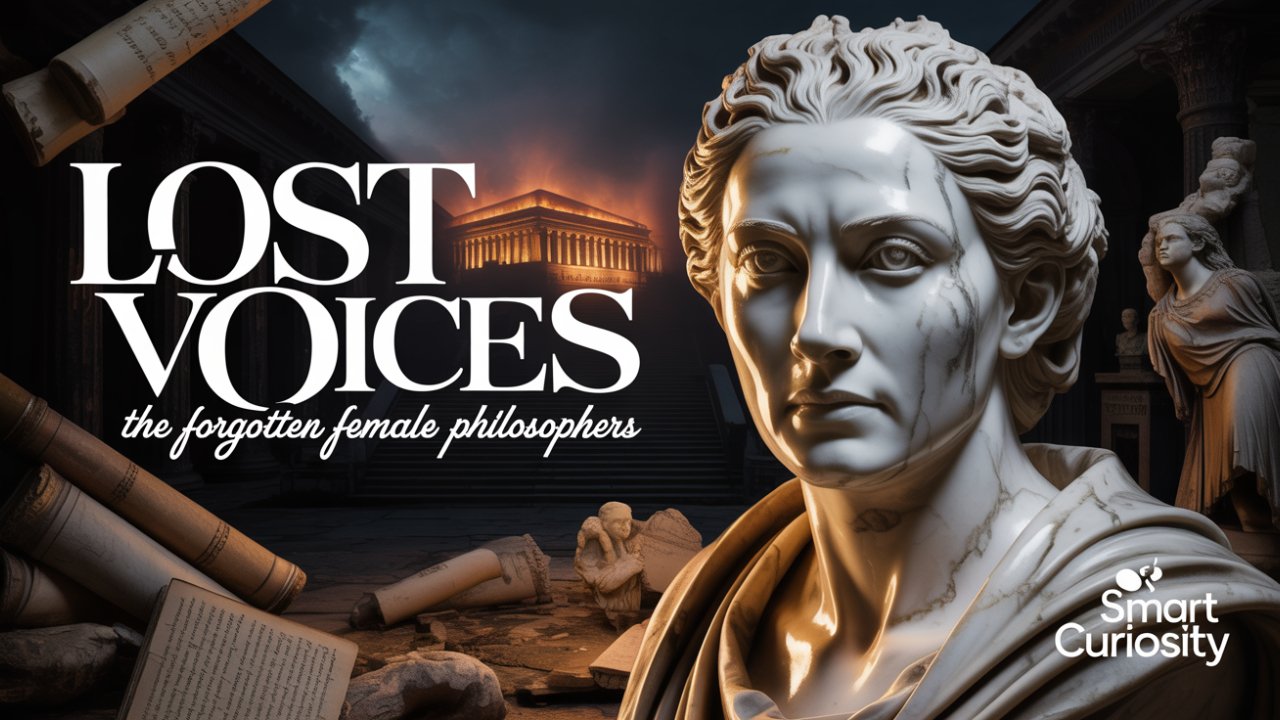When you think of ancient philosophy, you think of these guys. Socrates. Plato. Aristotle. Their marble busts stare out from the pages of history, their names practically synonymous with the foundations of Western thought. They were the architects of logic, ethics, and metaphysics. They asked the big questions, and for two thousand years, we’ve been told they were the only ones asking them.
But the story we’ve been told is only half the truth. It’s a story with pages torn out, with voices deliberately silenced. A story where the ink is exclusively masculine.
What if some of the greatest minds and bravest thinkers of antiquity were not men? What if they were women, whose stories were so threatening to the established order that they were systematically erased, their ideas buried under the sands of time?
What if I told you that one of the most brilliant minds of the ancient world a master mathematician and philosopher who advised city leaders and drew students from across the Roman Empire was a woman? And that her story ends with her being brutally murdered by a mob, not for any crime, but for the unforgivable sin of being too intelligent, too influential, and too independent in a world run by men?
Her name was Hypatia, and she’s just one of the lost voices we’re uncovering today. This is a journey to reclaim a stolen history, to find the women who dared to think, to speak, and to lead, long before they were told they couldn’t.
The Last Light of Alexandria: Hypatia
To understand Hypatia, you have to understand her city. Alexandria, at the turn of the 5th century AD, wasn’t just a city; it was the intellectual capital of the world. A dazzling, chaotic, and dangerous metropolis where the great library, though a shadow of its former self, still cast a long legacy. It was a crucible of clashing cultures Greek, Egyptian, Roman, Jewish and a battleground of faith. The old pagan gods were in their twilight, and the fervent new religion of Christianity was on the rise, aggressive and hungry for power.
Into this powder keg, Hypatia was born, likely sometime between 350 and 370 AD. She was the daughter of Theon of Alexandria, himself a renowned mathematician and the head of a prestigious school. In an era when women, even elites, were overwhelmingly confined to the home, Theon made a radical choice. He saw a prodigious intellect in his daughter, a fire he would not allow society to extinguish. He decided to raise not a proper lady, but as one historian put it, a “perfect human being.”
Hypatia’s education was all-encompassing. She studied mathematics, mastering complex geometry and algebra. In fact, much of what we know about certain ancient mathematical texts may have survived because of the commentaries she wrote, making them more accessible for her students. She was also an astronomer and an engineer. Ancient sources connect her with teaching her students how to design and use scientific instruments like the astrolabe for celestial navigation and the hydrometer for measuring the density of liquids.
But her true calling was philosophy. By the year 400, Hypatia was the head of her own prominent Neoplatonist school in Alexandria, a position of immense prestige. A follower of the philosopher Plotinus, she taught that the goal of life was to use reason to ascend from the messy material world and achieve a spiritual union with a divine source called “the One.”
This wasn’t some dry, academic pursuit for her. She was, by all accounts, an electric and charismatic teacher. Ancient sources describe her donning the simple cloak of a philosopher and giving impromptu public lectures in the streets. Her school attracted the best and brightest young men from across the Mediterranean, pagans and Christians alike.
One of her most famous students was Synesius of Cyrene, who would later become a Christian bishop. His surviving letters to her paint a vivid picture of a revered teacher and cherished friend. He calls her “mother, sister, teacher,” and “my most revered philosopher.” He wrote to her for intellectual guidance, personal advice, and even help building an instrument based on her design. These letters show a woman respected by many Christian leaders, a figure whose intellectual authority transcended religious divides.
Her influence wasn’t confined to the classroom. Hypatia became a trusted counselor to the city’s political elite, most notably the Roman prefect, Orestes. He was a former student and close friend, and he relied heavily on her wisdom. In a city teetering on the edge of civil war, Hypatia was a voice of reason and classical virtue.
And that’s what made her so dangerous.
The rising power in the city was Cyril, the newly appointed Patriarch of Alexandria. Cyril was ambitious, ruthless, and a zealot. He saw the world in black and white and despised the intellectual authority of Greek philosophy, seeing it as a threat to the Church’s total dominance.
The stage was set for a brutal power struggle between Orestes, representing civil authority, and Cyril, leading a militant church. Caught in the middle was Hypatia.
To Cyril, Hypatia was more than just a philosopher; she was the source of Orestes’s strength. She was the reason the prefect would not bow to his authority. Slanderous rumors spread through the city, whispered in marketplaces and shouted from pulpits. They called Hypatia a witch who had enchanted Orestes with dark magic.
The tension finally snapped in March of 415 AD, during Lent. As Hypatia made her way through the city, she was ambushed by a mob led by a church official. It wasn’t a spontaneous riot; it was a planned assassination.
They dragged her from her carriage to a nearby church. One gruesome ancient account tells us that inside, they stripped her and used sharpened oyster shells or broken pottery to flay the skin from her body. Then, they dragged her mutilated remains through the streets and burned them.
It was an act designed not just to kill a woman, but to obliterate a symbol. By murdering her in a church, they performed a ritual of purification. By destroying her body, they tried to erase her legacy. It was a message: reason, philosophy, and female authority would no longer be tolerated in the new Christian Alexandria.
In the centuries since, Hypatia’s story has been twisted. She’s been a romantic heroine, a martyr for science, a feminist icon. But these legends often obscure the real woman. The historical Hypatia wasn’t simply a victim. She was a political player whose authority became an intolerable obstacle in a savage game of power. Her voice was lost not because it was weak, but because it was too strong.
The Predecessors – Echoes Before the Silence
Hypatia wasn’t an isolated flash in a long, dark night. She was the inheritor of a tradition, a lineage of female thinkers stretching back to the very dawn of Western philosophy. Centuries before her, other women dared to think and teach. Their voices are fainter now, pieced together from fragments and the biased accounts of male writers, but they’re there.
Let’s jump back almost a thousand years before Hypatia, to the 6th century BC in what is now southern Italy. This was the home of Pythagoreanism. We remember Pythagoras for his theorem, but he was more like a mystic guru. He founded a community dedicated to studying numbers, the cosmos, and the soul. And in a radical move for the Greek world, his school was open to women.
At the heart of this community was Theano of Croton. The sources are tangled they call her the wife, daughter, or brilliant student of Pythagoras. What’s clear is her stature. After Pythagoras’s death, Theano is said to have taken over the school. She was a formidable thinker in her own right, and later traditions attributed writings on mathematics and physics to her. More reliably, she and her fellow female Pythagoreans explored the concept of harmonia the balance and binding together of opposites. A surviving fragment shows her wrestling with core Pythagorean doctrine: “Many of the Greeks believe Pythagoras said all things are generated from number,” she wrote. “The very assertion poses a difficulty: How can things which do not exist even be conceived to generate?” That’s not a follower; that’s a philosopher pushing the boundaries.
Now, let’s move forward a century, to the Golden Age of Athens. Here we meet Aspasia of Miletus. Because she was a foreign resident, or metic, Aspasia was free from the suffocating restrictions placed on Athenian wives, who were kept in seclusion. And Aspasia was anything but secluded.
She was a master of rhetoric, the art of persuasion, which in democratic Athens was the key to power. Her home became the city’s premier intellectual salon, a gathering place for the greatest minds of the age: playwrights, sculptors, and even Socrates himself. Plato and Xenophon, two of Socrates’ most famous students, both suggest that Aspasia was a teacher to Socrates, a figure who helped shape his philosophical method.
Her intellect captivated the most powerful man in the city, the statesman Pericles. They formed a partnership, and she became his closest advisor. Her influence was so well-known that her enemies claimed she wrote Pericles’ most famous speeches, including his legendary Funeral Oration.
But a brilliant foreign woman holding sway over Athens’s leader was an intolerable scandal. They couldn’t attack her on intellectual grounds, so they attacked her character. The comic playwrights the tabloids of their day relentlessly mocked her. They labeled her a high-class courtesan, or hetaira, and a brothel-keeper, recasting her intellectual salon as a den of vice. It was a successful smear campaign that has echoed through history, an attempt to reduce the philosopher to a seductress.
In that same Socratic circle, we hear of another voice, a woman Socrates himself claimed was his teacher on the subject of love: Diotima of Mantinea.
Our only source for her is Plato’s dialogue, the Symposium. When it’s Socrates’s turn to speak about love, he doesn’t offer his own ideas. Instead, he recounts what he learned from a wise priestess. It is Diotima who, through Socrates, introduces the famous “Ladder of Love” the idea that our desire can ascend from love for a single beautiful body, to the love of all beauty, to the love of knowledge, and finally, to a glimpse of Beauty itself.
It’s one of the most influential concepts in philosophy, and Plato gives the credit to a woman. But was she real? Scholars have debated it for centuries. Some say she’s a fictional creation. But why would Plato, in a dialogue full of real people, invent just one? The fact that her existence is even questioned is revealing. Her voice is so faint, recorded only by a man, that she risks fading into myth a perfect symbol for how the contributions of women become obscured.
While some women navigated the corridors of power, others chose radical rebellion. None was more radical than Hipparchia of Maroneia. Born into a wealthy family in the late 4th century BC, she fell in love with Crates of Thebes, a leading Cynic philosopher. The Cynics were the punks of the ancient world. They believed virtue came from rejecting all social conventions: wealth, status, even basic shame. They lived on the streets to prove their indifference to societal norms.
Hipparchia was enthralled. She threatened her horrified parents with suicide if they didn’t let her marry Crates. Crates himself tried to dissuade her. He stood before her, took off his ragged cloak, and said, “Here is the bridegroom, and this is his property. Make your choice.” She chose him without hesitation. She gave up her wealth, donned the Cynic’s cloak, and lived on the streets of Athens with her husband as a philosophical equal an arrangement almost unthinkable in ancient Greece.
She didn’t just live the philosophy; she argued it. A famous story tells of her confronting a male philosopher at a banquet. He taunted her, asking why she wasn’t at her loom. She shot back with flawless logic defending her right to be there, leaving him speechless. She chose absolute philosophical freedom over every comfort and convention.
These are not the only voices. There was Arete of Cyrene, who took over her father’s philosophical school and became so famous that her son was nicknamed “Mother-Taught.” Her epitaph, likely from a later tradition, praised her for possessing “the soul of Socrates, and the tongue of Homer.” These women were part of a vibrant, but fragile, tradition. A tradition that would be systematically dismantled and forgotten.
The Successors – The Fading Embers
The tradition of female intellect didn’t die with Hypatia, but the world was changing. The late Roman Empire was becoming increasingly hostile to the pagan philosophical schools where these women had thrived. Yet, even in this twilight, a few more voices managed to shine through.
Around the same time Hypatia was teaching in Alexandria, another brilliant woman was making a name for herself in modern-day Turkey. Her name was Sosipatra of Ephesus. The historian Eunapius tells her incredible story. After her husband’s death, Sosipatra founded her own philosophical school in Pergamon. Her reputation grew to equal, and perhaps even surpass, that of the leading male philosopher in the city. In a remarkable arrangement, students would get their introductory lessons from him, but the advanced “inner circle” would then go to Sosipatra for higher instruction in metaphysics. This shows she wasn’t a secondary figure; she was considered the master of the most profound doctrines.
A generation later, in the 5th century, the flame still burned in Athens, where we find Asclepigenia. She was the daughter of the head of the city’s prestigious Neoplatonic Academy, and just as Theon had educated Hypatia, her father trained her in the philosophies of Plato and Aristotle.
Asclepigenia became a leading teacher at the Academy, and her most famous student was Proclus, who would become one of the last and greatest philosophers of antiquity. And it was Asclepigenia who taught him. She instructed him in core doctrines and initiated him into mystical rituals she had inherited from her father. She was a crucial link in the chain, a master of metaphysics and the teacher of the last great pagan philosopher.
Sosipatra and Asclepigenia represent the final embers of a fire that had burned for a millennium. But the institutions that had supported them were being shut down. In 529 AD, the Emperor Justinian officially closed the Academy in Athens Plato’s school which had run for over 900 years. The last philosophers scattered. The voices of women, which had grown faint, now fell into a long, profound silence.
The Anatomy of Erasure – Why We Lost Their Voices
So where did they all go? Why have Theano, Aspasia, and Hypatia vanished from our history books, while the names of their male contemporaries are foundational to our culture?
Their erasure wasn’t an accident. It was a systematic silencing, a result of cultural biases that worked to marginalize, misrepresent, and ultimately forget the intellectual contributions of women.
First, history was a story told by men, for men. The institutions of philosophy, politics, and record-keeping were overwhelmingly patriarchal. When a woman like Aspasia defied these norms, she was seen as a threat. The male writers who recorded her existence used a powerful tool: misrepresentation. Unable to defeat her ideas, they attacked her character, recasting the brilliant philosopher as a corrupt seductress. This sexualization of female intellect is a classic tactic, designed to diminish a woman’s achievements by reducing her to her body.
Second, there’s the brutal fact of textual survival. For centuries, texts were copied by hand, mostly by male monks. These scribes made choices about what was worth preserving. In a world that viewed women as intellectually inferior, the works of female philosophers were simply not a priority. A treatise by Plato would be copied countless times. A treatise by Hipparchia? It was lucky to be copied once. Through this kind of neglect, their works simply disappeared. We are left with ghosts in the machine: quotes and anecdotes preserved only in the surviving works of men. We hear Diotima’s voice only because Plato chose to record it.
Third, the very nature of their philosophy was often devalued. Many of these women wrote on ethics, household management, and virtue in daily life. Later, male-dominated traditions elevated abstract metaphysics and logic as “true” philosophy, dismissing these more grounded topics as secondary. The philosophy of the home and the city areas where women held unique authority was subtly written out of the “canon” of important thought.
Finally, there was the seismic shift of religious and political upheaval. The rise of institutional Christianity was often hostile to both pagan philosophy and female authority. Hypatia’s murder is the most dramatic example. She was killed not just as a pagan, but as a powerful public intellectual whose authority stood in the way of the rising Church. As the pagan schools were closed and their libraries neglected, the legacy of a female philosopher stood little chance.
The result of these combined forces patriarchal storytelling, selective preservation, the devaluing of their work, and religious persecution was a near-total erasure. A collective amnesia.
Rediscovering the Lost Voices
We’ve journeyed back through the centuries, sifting through the fragments of a broken history to hear the faint echoes of silenced voices. We’ve met Hypatia, the brilliant star of Alexandria, whose light was brutally extinguished. We’ve heard the arguments of Aspasia, whose intellect was so threatening it had to be buried under slander. We’ve walked the streets with Hipparchia, who sacrificed everything for a life of radical honesty.
Their stories are more than just historical curiosities. They’re a profound reminder that the narrative we’ve inherited is incomplete. The history of ideas has not been a monologue delivered by a chorus of men. It has been a dialogue where half of the participants were written out of the script.
Recovering these stories is an act of historical justice. It forces us to ask critical questions: Who writes history? Whose stories are deemed important enough to save? And what have we lost what insights, what entire worlds of thought because their authors were women?
The rediscovery of these lost voices changes our understanding of the past. It reveals a hidden lineage of female intellectual courage stretching back to the beginnings of Western civilization. But their stories also resonate today. The challenges these women faced the struggle for recognition, the fight against being defined by their gender, the danger of being a powerful woman in a man’s world are challenges that still echo.
The work of uncovering these voices is far from over. For every Hypatia whose name we can recover, countless others are lost forever. But with every fragment we piece together, with every story we retell, we are challenging the silence. We are making our history a little more whole, and a little more true. The voices were lost, but they were never truly gone. They were just waiting for us to listen.
If you believe these stories need to be told, and that the history we learn should be the full history, then subscribe for more chapters in our ‘Lost Voices’ series. Help us continue the work of rediscovering the thinkers, creators, and leaders who have been forgotten.





